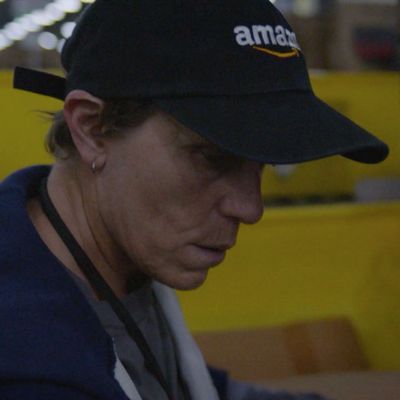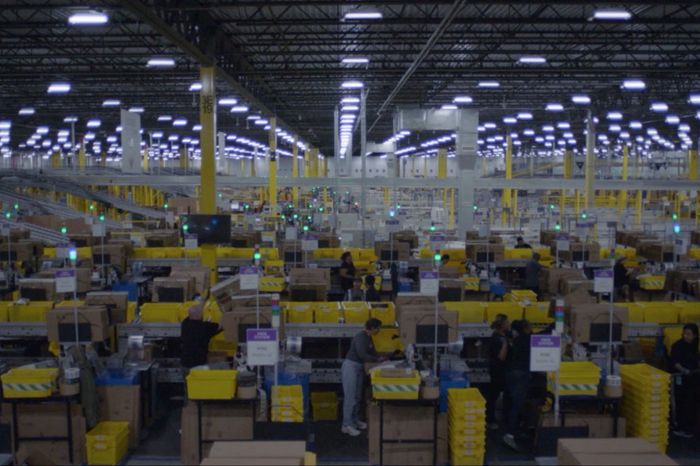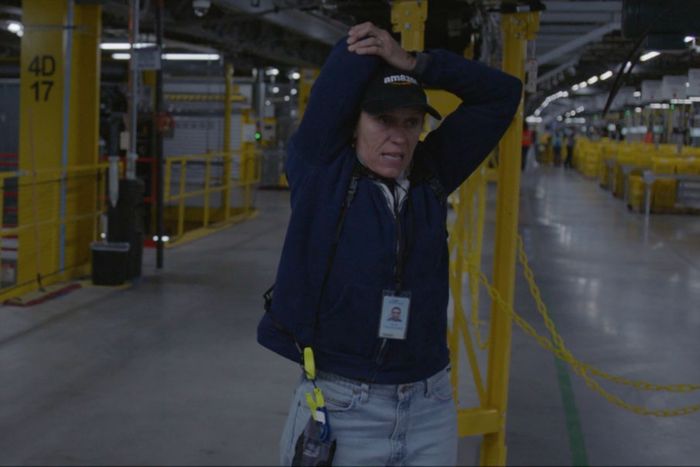
When journalist Jessica Bruder began reporting her 2017 book Nomadland: Surviving America in the Twenty-First Century, the foreclosures and vaporized investments of the Great Recession were pushing many seniors to hit the road. She met elderly Americans across the country who were living out of vehicles to save their meager Social Security benefits and performing grueling physical labor to survive — people like then-64-year-old Linda May. A seasonal worker at CamperForce, Amazon’s jobs program for van-dwelling retirees, she experienced dizziness during her shifts at the Amazon warehouse that landed her in the emergency room and got a repetitive motion injury from using her scanner gun. Another CamperForce worker, 71-year-old Chuck Stout was knocked flat by a box that flew off the conveyor belt at Amazon, his head hitting the concrete floor with a thud; moments later, in-house medics had him back on his feet, declared he didn’t have a concussion, and sent him back to work.
The nomads didn’t get hurt only at Amazon. While working as a campground host in California, Linda May broke a rib while bear-proofing a dumpster; Charlene Swankie, 72, cracked three ribs while campground-hosting in the Rockies. While staffing an amusement park, Steve Booher, 68, fell from a loading platform and onto a conveyor belt, fracturing his skull. He died.
Bruder describes the nomads as “plug-and-play labor, the epitome of convenience for employers in search of seasonal staffing. They appear where and when they are needed. They bring their own homes … They aren’t around long enough to unionize. On jobs that are physically difficult, many are too tired even to socialize after their shifts.” As one 77-year-old worker told her: “They love retirees because we’re dependable. We’ll show up, work hard, and are basically slave labor.”
Reading Bruder, we understand that these “accidents” are the logical outcomes of an economic system that takes advantage of the country’s most vulnerable. So when 60-something protagonist Fern (Frances McDormand) rolls up in an old white van to work at a real Amazon warehouse in the first three minutes of Nomadland, director Chloé Zhao’s fictional film adaptation of Bruder’s book, we are tensed for class conflict. But Zhao’s adaptation, which follows Fern as she drives through majestic landscapes in the American west picking up temporary employment, is only superficially the same narrative.
Already an Oscar favorite, many critics have praised Nomadland as a portrait of modern America. The idea of authenticity has been core to Zhao’s previous films, which were developed around the real-life stories of her cast of mostly non-professional actors; she imports this technique to Nomadland, featuring actual nomads from Bruder’s book, including Linda May and Swankie. Fern, however, is a fictional character, sutured into the landscape by Zhao and McDormand to be our compassionate, dryly humorous, Shakespeare-reciting guide to the nomadic world. Crucially, unlike the subjects in the book, Fern has no complaints about her jobs—including her time at Amazon. And because the film is primarily a character study of her, it exchanges Bruder’s sharp indignation over capitalist exploitation for a muddled message about individual freedom that downplays the real stakes of gig labor.
According to the film’s backstory, Fern lost her job and house when the United States Gypsum Company shut down, and along with it shuttered the small company town of Empire, Nevada in 2011. Fern is the widow of a man who also worked at the gypsum plant before he died; they never had children. She’s haunted by her late husband’s memory, recalling a simpler, safer time when “there was nothing in our way.” She chooses the road, we learn, not because she has no other options, but so she can mourn, and recover a sense of possibility.
In McDormand’s recent Vogue cover story, she reveals Fern was an emanation of a fantasy she had in her 40s, telling her husband, filmmaker Joel Coen: “When I’m 65, I’m changing my name to Fern, I’m smoking Lucky Strikes, drinking Wild Turkey, I’m getting an RV, and hitting the road.” It was McDormand, who after reading Bruder’s book, enlisted Zhao to bring that vision to life. In an interview during Nomadland’s film festival circuit, McDormand, an adoptee who still calls herself and her biological mother “white trash,” says she modeled Fern after her younger self as she struck out into the world. “There’s a childlike quality that we were really interested in for Fern… where I started at 17, she starts at 61.” This might explain why McDormand’s Fern is so insistent on self-reliance: she spurns offers of spare rooms from the financially secure suburbanites who care about her, preferring her Econoline to their beautiful, tidy homes. When she has to borrow money from her sister (Melissa Smith) to pay for van repairs, she repeatedly insists that she’ll pay her back. She may have to shit in a five-gallon bucket, but it’s all worth it, because she’s a free woman, not a victim, and she’s going to smoke those Lucky Strikes.
There’s nothing wrong with portraying disenfranchised folks as bold, resilient, people — most are — so long as we fully account for the structures aligned against them. It’s why it’s not enough to call essential workers “heroes”: we need to get them hazard pay, time off, and PPE. But this is where Nomadland stumbles, apparently deciding it wasn’t possible to both portray Fern as dignified and depict the grim truth of migrant labor. The rough edges have been sanded off: We see Fern saunter down the Amazon warehouse floor with a bin, shooting a grin at Linda May, who’s scanning packages nearby. We see her on lunch break with a table of smiling coworkers; their cheerful supervisor shows off song lyrics tattooed on their arm. After work, Fern runs into an old friend, who asks, how’s working at Amazon? “Great money,” Fern replies. And that’s the extent of the film’s insight about the e-commerce giant, which ends up disappearing blandly into Nomadland’s terrain. Zhao opts for a similar view from nowhere on Fern’s other gigs as a campground host, line cook, and sugar beet plant worker. These are cast as interchangeable backdrops, not specific challenges to overcome. It feels less like artistic license than a betrayal of workers’ reality.
In interviews, the filmmakers have given mixed answers about whether Nomadland is a “political” movie. Zhao told Indiewire last September that she wanted to avoid politics: “I tried to focus on the human experience and things that I feel go beyond political statements to be more universal — the loss of a loved one, searching for home.” She told Vulture’s Alison Willmore that politics were embedded into Nomadland’s every frame “if you look deeply… it’s just, yes, there’s the beautiful sunset behind it.” But in an interview with The Wrap earlier this month, Zhao’s partner and cinematographer Joshua James Richards said it was a “weird argument to say the movie is making a big critical statement” about Amazon. “I mean, we simply show Fern working there. We also show a Ford Econoline as well, but I don’t think we’re making a big critical statement about Ford. Obviously, you can find politics in anything.”
We get a bit more insight from McDormand, who has explained that she got permission to shoot in Amazon by sending an email to the company’s senior VP of business development, Jeff Blackburn. “It was right before they started giving people $15 an hour,” she told The Hollywood Reporter last fall. “This was a really smart move for them because … we are telling a story about a person who is benefiting from hard work, and working at the Amazon fulfillment center is hard work, but it pays a wage.” Of course, paying a wage would be considered the bare minimum. (And whether it’s a fair wage is far from a consensus among workers themselves.)
What kind of film would Nomadland have been if the real nomads’ perspectives had been front and center? Amazon warehouse workers have reported walking up to twenty miles a day on concrete, carrying goods across massive warehouses while trying to beat a digital-countdown timer, with no benefits for CamperForce recruits besides a stipend to help cover campground fees. Near the end of Bruder’s book, Linda May offers a blistering take on Amazon, with a clarity that’s completely omitted from her performance in Zhao’s film: “I hate this fucking job,” she says, calling the company “probably the biggest slave owner in the world.” Another elderly CamperForce worker, Patty DiPino, confesses to Bruder that she tells her friends not to buy on Amazon. “I mean, the rich are getting richer while we’re sitting here getting poorer.” Bruder informs us that DiPino eventually dies of cancer. On DiPino’s Facebook page, a friend posts a memorial: “You are finally debt free and living in your forever home! No more freezing in the desert or in Kansas! No more cramped spaces … I will miss you dearly.”
These stories are blatantly absent from the film adaptation. By skipping over the mistreatment that circumscribes so many nomads’ final years, the filmmakers end up provincializing their experiences and diminishing them. It plays into platform capitalists’ favorite talking point: that temporary gig work, shorn of all rights and benefits, is what the workers want, because freedom! because flexibility! It portrays gig work as a refuge during hard times, when the truth is temporary jobs are often harder to find during crises like the pandemic — and only exacerbate workers’ uncertainty. By telling half the story, the film misses the core insight that made Bruder’s book so heart-wrenching: that there is no escape from the American economic system, and it preys upon the nomads continuously. Not only by leaving them houseless, but by then exploiting their precarity to work them straight into the ground.
Over the last year, the inhumanity Bruder described has been made plain. Amazon bosses have gained astonishing wealth while throwing their workers into the path of a virus that has left nearly half a million Americans dead. As I write this, Amazon workers in Alabama are voting on a historic unionization effort. They are protesting unsafe working conditions on the pandemic’s front lines; they want to be able to eat lunch and take bathroom breaks without fear of getting fired. The company’s all-out efforts to quash the movement speak volumes.
Not every story about the present needs to be explicitly political. But why cast actual survivors in a drama about their struggle, then invent a new, less vulnerable character just to water it down? It feels like a missed opportunity, as if the filmmakers squeezed real life into a narrative they hoped would resonate more broadly — but left out precisely what made it so urgent. For too many people, there’s no driving into the sunset. There’s just the edge of breaking down, again and again.



